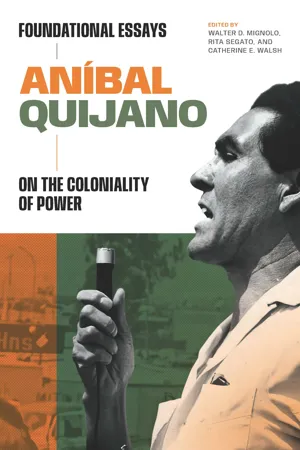
Aníbal Quijano
Foundational Essays on the Coloniality of Power
- 408 pages
- English
- PDF
- Available on iOS & Android
Aníbal Quijano
Foundational Essays on the Coloniality of Power
About This Book
The Peruvian sociologist Aníbal Quijano is widely considered to be a foundational figure of the decolonial perspective grounded in three basic concepts: coloniality, coloniality of power, and the colonial matrix of power. His decolonial theorizations of these three concepts have transformed the principles and assumptions of the very idea of knowledge, impacted the social sciences and humanities, and questioned the myth of rationality in natural sciences. The essays in this volume encompass nearly thirty years of Quijano's work, bringing them to an English-reading audience for the first time. This volume is not simply an introduction to Quijano's work; it achieves one of his unfulfilled goals: to write a book that contains his main hypotheses, concepts, and arguments. In this regard, the collection encourages a fuller understanding and broader implementation of the analyses and concepts that he developed over the course of his long career. Moreover, it demonstrates that the tools for reading and dismantling coloniality originated outside the academy in Latin America and the former Third World.
Frequently asked questions
Information
Table of contents
- Cover
- Contents
- Introduction / Catherine E.Walsh, Walter D.Mignolo, and Rita Segato
- 1. Paradoxes of Modernity in Latin America
- 2. The Aesthetic of Utopia
- 3. Coloniality and Modernity/Rationality
- 4. Questioning "Race"
- 5. Coloniality of Power and Social Classification
- 6. The Return of the Future and Questions about Knowledge
- 7. Coloniality of Power, Globalization, and Democracy
- 8. The New Anticapitalist Imaginary
- 9. Don Quixote and the Windmills in Latin America
- 10. The “Indigenous Movement” and Unresolved Questions in Latin America
- 11. Coloniality of Power, Eurocentrism, and Latin America
- 12. Coloniality of Power and De/Coloniality of Power
- 13. Thirty Years Later: Another Reunion: Notes for Another Debate
- 14. The Crisis of the Colonial/Modern/Eurocentered Horizon of Meaning
- 15. Latin America: Toward a New Historical Meaning
- 16. Coloniality of Power and Subjectivity in Latin America
- 17. "Bien Vivir": Between "Development" and the De/Coloniality of Power
- 18. Labor
- 19. Notes on the Decoloniality of Power
- 20. Modernity, Capital, and Latin America Were Born the Same Day: Interview by Nora Velarde
- Bibliography
- Index